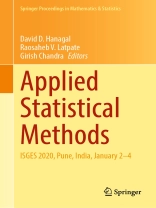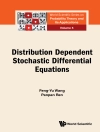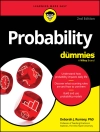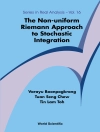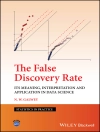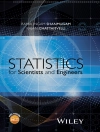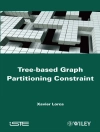This book collects select contributions presented at the International Conference on Importance of Statistics in Global Emerging (ISGES 2020) held at the Department of Mathematics and Statistics, University of Pune, Maharashtra, India, from 2–4 January 2020. It discusses recent developments in several areas of statistics with applications of a wide range of key topics, including small area estimation techniques, Bayesian models for small areas, ranked set sampling, fuzzy supply chain, probabilistic supply chain models, dynamic Gaussian process models, grey relational analysis and multi-item inventory models, and more. The possible use of other models, including generalized Lindley shared frailty models, Benktander Gibrat risk model, decision-consistent randomization method for SMART designs and different reliability models are also discussed. This book includes detailed worked examples and case studies that illustrate the applications of recently developed statistical methods, making it a valuable resource for applied statisticians, students, research project leaders and practitioners from various marginal disciplines and interdisciplinary research.
قائمة المحتويات
X. Chen and B. Nandram, Bayesian Order-Restricted Inference of Multinomial Counts from Small Areas.- L. Chen and B. Nandram, A Hierarchical Bayesian Beta-Binomial Model for Sub-Areas.- P. Anjoy and H. Chandra, Hierarchical Bayes Prediction of Survey-Weighted Small Area Proportions.- E. Zamanzade1 and M. Mahdizadeh, Efficiency of Ranked Set Sampling Design in Goodness of Fit Tests for Cauchy Distribution.- M. R. Bhosale1, R. Latpate and S. Gitte, Fuzzy Supply Chain Newsboy Problem Under Lognormal Distributed Demand for Bakery Products.- S. Kurade, R. Latpate and D. Hanagal, Probabilistic Supply Chain Models with Partial Backlogging for Deteriorating Items.- P. Ranjan and M. Harshvardhan, The Evolution of Dynamic Gaussian Process Model with Applications to Malaria Vaccine Coverage Prediction.- K. Uniyal1, G. Chandra, R. U. Khan and Y. P. Singh, Grey Relational Analysis for the Selection of Potential Isolates of Alternaria Alternata of Poplar.- Nidhi D. Raykundaliya and Dharmesh P. Raykundaliya.- Decision making for Multi-items Inventory Models.- A. Pandey, David D. Hanagal, S. Tyagi and P. Gupta, Modeling Australian Twin Data using Generalized Lindley Shared Frailty Models, K. Jain and H. S. Kapoor, Ultimate Ruin Probability for Benktander Gibrat Risk Model, K. K. Mahajan, S. Arora and A. Gaur, Test of Homogeneity of Scale Parameters Based on Function of Sample Quasi Ranges.- T. Dai and Sanjay Shete, A Bayesian Response-Adaptive, Covariate-Balanced and Q-learning-Decision-consistent Randomization Method for SMART Designs.- J. Sedransk, An introduction to Bayesian Inference for Finite Population Characteristics.- S. C. Malik, Reliability Measures of Repairable Systems with Arrival Time of Server.- P. V. Pandit and S. Joshi, Stress-Strength Reliability estimation for Multi-component system Based on Upper Record Values under New Weibull-Pareto Distribution.- V. S. Vaidyanathan and H. Bakouch, Record Values and Associated Inference on Muth Distribution.- Shalabh, Statistical Linear Calibration in Data with Measurement Errors.
عن المؤلف
DAVID D. HANAGAL
is Honorary Professor at Symbiosis Statistical Institute, Symbiosis International University, Pune, India. Earlier, he was Professor at the Department of Statistics, Savitribai Phule Pune University, Maharashtra, India. He also has worked as a visiting professor at several universities in the USA, Germany, and Mexico. His research interests include statistical inference, selection problems, reliability, survival analysis, frailty models, Bayesian inference, stress–strength models, Monte–Carlo methods, MCMC algorithms, bootstrapping, censoring schemes, distribution theory, multivariate models, characterizations, repair and replacement models, software reliability, quality loss index, and nonparametric inference.
With more than 40 years of teaching experience and more than 35 years of research experience, he is an expert on writing programs by using SAS, R, MATLAB, MINITAB, SPSS, and SPLUS statistical packages. He has supervised nine Ph D students in different areas of statistics namely, reliability, survival analysis, frailty models, repair and replacement models, software reliability, and quality loss index. An elected fellow of the Royal Statistical Society, UK, he is an editor and on the editorial board of several respected international journals. He has authored four books, three book-chapters and published more than 130 research publications in leading journals. He has delivered more than 100 invited talks in many national and international platforms of repute worldwide. RAOSAHEB V. LATPATE is Assistant Professor at the Department of Statistics and Center for Advanced Studies, Savitribai Phule Pune University, Maharashtra, India. After his graduation from the Department of Statistics, Dr. Babasaheb Ambedkar Marathwada University, Aurangabad, Maharashtra, India, in 2005, he earned his Ph D degree from the same university. His research interests include genetic algorithm, fuzzy set theory, supply chain management, logistics and transportation problem, simulation and modelling, and sample survey.
He has organized three international conferences and three national conference, workshop, and faculty development programme on statistical methods and applications. He is member of several professional societies and institutions, including the International Statistical Institute, International Indian Statistical Association, the Society for Statistics and Computer Applications, and the Indian Society for Probability and Statistics.
GIRISH CHANDRA is Scientist in the Division of Forestry Statistics, Indian Council of Forestry Research and Education (ICFRE), Dehradun, an autonomous body under the Ministry of Environment, Forest and Climate Change, Government of India, in Uttrakhand. Before joining ICFRE in 2013, he worked at the Tropical Forest Research Institute, Jabalpur, and at Central Agricultural University, Sikkim, India, for more than seven years. He is a recipient of the Cochran–Hansen Prize 2017 of the International Association of Survey Statisticians, the Netherlands. He also is honored with ICFRE Outstanding Research Award 2018 besides the Young Scientist Award in Mathematical Sciences from the Government of Uttarakhand, India. He has published over 45 research papers in various respected journals and have three books to his credit. He has organised two national conferences on forestry and environmental statistics. He is member of various scientific institutions, including the International Statistical Institute, International Indian Statistical Association, Computational and Methodological Statistics, Indian Society of Probability and Statistics.
